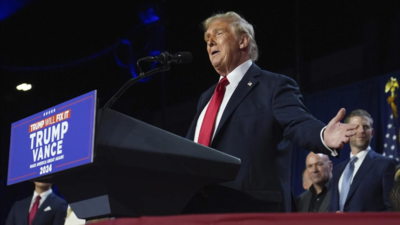
Donald Trump, a climate change sceptic’s return to the White House raises significant concerns for environmental policies and worldwide efforts to address global warming.
The victorious Republican candidate promoted increased oil and gas extraction during his campaign, referring to US fossil fuel reserves as “liquid gold” in his acceptance speech.
Environmental specialists indicate that this presidency could significantly impede the shift towards sustainable energy, compromising essential climate objectives, news agency AFP reported.
The effects are anticipated to manifest before the January installation ceremony.
US representatives at the upcoming COP29 UN climate conference in Azerbaijan, beginning November 11, will likely see their influence diminish.
A diminished American role in climate discussions could weaken international initiatives to reduce fossil fuel usage, potentially encouraging major polluting nations like China and India to reduce their environmental commitments.
“With Trump’s win, we now face, at best, a repeat of his last term’s climate inaction — a four-year pause we simply can’t afford in this critical decade,” said Johan Rockstrom, a climate scientist and director of the Potsdam Institute for Climate Impact Research.
“With a climate sceptic back in the White House, the pressure on the world, and especially on EU leadership, to act will intensify enormously.”
His previous presidential record is significant. He withdrew from the Paris Agreement during his first term and intends to do so again, following President Biden’s restoration of US participation.
The official withdrawal process requires one year from notification, keeping the US technically involved until 2026.
“It’s worse than 2016. And not only in the United States,” Laurence Tubiana, the architect of the Paris deal, told AFP.
“It will take an unprecedented mobilization so that the shock of the American decision does not impact other countries that have become reluctant to accelerate action.”
The US committed to reducing greenhouse emissions by 50% by 2030 compared to 2005 levels under the Paris Agreement. By 2023, emissions decreased by 18%, according to the Rhodium Group.
Carbon Brief analysis suggests this presidency could result in additional emissions of four billion metric tonnes of CO2 equivalent by 2030, comparable to the EU and Japan’s combined annual emissions.
“The outcome of the American election will have ramifications for the whole planet,” Leah Stokes, a political scientist at the University of California, Santa Barbara, who specialises in climate, told AFP.
Efforts to limit warming and protect against climate change impacts “hang in the balance”, particularly for vulnerable poorer nations, said Joyce Banda, the former President of Malawi.
“As a global superpower, we expect the US to do the right thing for the sake of the world and generations to come.”
He intends to cancel remaining funds from Biden’s Inflation Reduction Act, which provides substantial support for clean energy development.
However, legislative changes present challenges.
Some Republican representatives recognise the tax benefits and resist complete removal.
He plans to end restrictions on liquefied natural gas export permits and oppose emissions standards promoting electric vehicle adoption.
Recent Environmental Protection Agency regulations targeting power plant carbon emissions might face elimination.
“I do expect to see a fair amount of litigation over any efforts to repeal these regulations,” Fatima Ahmad, of the climate consulting firm Boundary Stone Partners, told AFP.
She anticipates continued climate action from state and local governments and private sector initiatives, similar to his first term.
Despite these local efforts, the potential national and international implications remain substantial.






